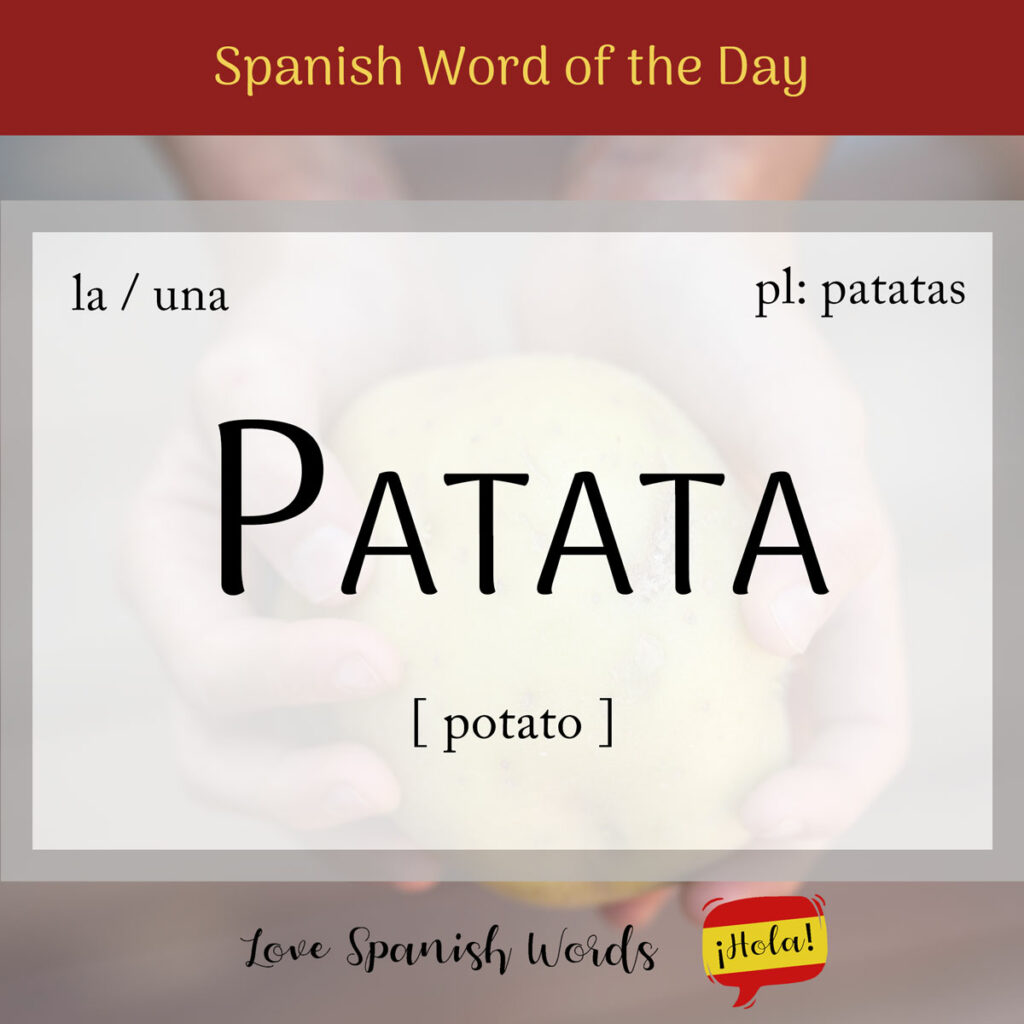With many people nowadays opting for a low-carb diet, they might be steering clear of my favourite food: potatoes. Interestingly, the English word potato actually comes from the Spanish patata, which itself has its roots in Latin America.
It’s reported that the sweet potato was the first type of potato the Spanish encountered during their travels, possibly in Haiti. This variety is still known as the batata, distinct from the common potato both in plant and vegetable.
It was in Peru that they first saw the potato and it was known in Quechua as papa.
Therefore the Spanish word patata is a cross between the Taíno batata (sweet potato) and the Quechua papa (potato).
Latin American Pronunciation
European Pronunciation

Both the potato plant (patata) and its underground tubers (patatas), used as a vegetable, are feminine nouns and take the following definite and indefinite articles:
- la patata = the potato
- las patatas = the potatoes
- una patata = a potato
- unas patatas = some potatoes
Pelo las patatas con un cuchillo.
I peel the potatoes with a knife.

Interesting fact…
In most Spanish speaking countries, the synonym for potato is papa.
In Spain most of the country refers to the potato as patata, but in Andalucía, most of southern Spain and the Balearic Islands, it is much more common to hear potato being referred to as papa.
The whole of Latin America refers to the potato as papa.
Patatas in the kitchen
It is said that the potato is one of the most basic foodstuffs of humankind. Below is a list of some of the various ways of preparing or serving potatoes:
- patatas fritas = chips or French fries
- patatas al horno = roast potato
- ensalada de patatas = potato salad
- patatas deshechas or puré de patatas = mashed potato
- patatas bravas = fried potatoes with a spicy tomato sauce
- patatas a lo pobre = fried potatoes with onions and green peppers

As well as the above, one of my favorite dishes is tortilla de patatas, or Spanish omelette. This is not a tortilla like you would find in Latin America, which is usually made with maize flour.
The tortilla de patatas is a Spanish delicacy often served as a tapas dish. It can be put into a sandwich (bocadillo) with tomato and is always best made by grandma (la abuela).
It is made with potatoes (patatas), onion (cebolla), eggs (huevos), salt (sal), and oil (aceite). The potatoes and onions are first cooked in oil, then mixed with the beaten eggs, and added to a frying pan. It’s cooked on low heat until firm.
The tortilla then needs to be flipped using a plate so that the other side can be cooked until firm as well. Testing that a knife inserted into the center comes out clean means the tortilla is ready to be served hot or at room temperature.
Idioms with ‘patata’
The word patata is used in an idiomatic sense to mean nothing at all for example, No sabe ni patata de musica. – He knows nothing at all about music.
No me importa una patata
Literal translation: A potato isn’t important to me
English meaning: I don’t care at all
Pasar la patata caliente
Literal translation: To pass the hot potato
English meaning: To pass the buck
Finally a special mention to a little guy called el escarabajo de la patata (the Colorado potato beetle). He is a major pest of potato crops, native to North America and Central America, measuring about 10mm long with a bright yellow body and 10 brown stripes on his wings. Since the 1920s, he has spread throughout Europe (with the exception of the Balearic Islands and the Canary Islands) and is a UK notifiable quarantine pest.

